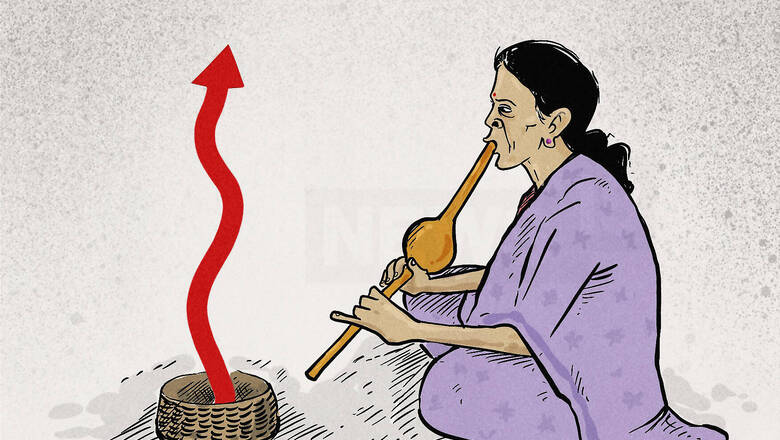
views
A big problem with policy makers in India is that they often see the economy as a machine whereas in reality it is an organism. And since in an organism, all organs are not just connected to but also impact each other; any improvement has to be overall, not piecemeal. While the Union Budget has an important role to play in the body economic, the Budget itself cannot transform the economy. Therefore, to expect a panacea from Finance Minister Nirmala Sitharaman would be unfair to her.
The entire system — from all organs of the government to regulators — has to function in unison. Fiscal, monetary, and economic policies should complement and supplement each other. That, unfortunately, is not happening.
Consider the huge corporate tax cut for domestic companies that the government announced in September 2019, foregoing Rs 1.45 lakh crore in the process. It was widely hailed as one of the biggest reform measures. The success of the reform, however, was predicated upon improving the business environment; and on that count, the Narendra Modi government has failed miserably. For while lower tax rates attract investors and industrialists, the factors that repel them have remained as potent as they ever were.
Consider, for instance, Commerce and Industry Minister Piyush Goyal’s indelicate remark on Amazon chief Jeff Bezos. “They [Amazon] may have put in a billion dollars but if they make a loss of a billion dollars every year, then jolly well will have to finance that billion dollar. So, it is not as if they are doing a favour to India when they invest a billion dollars,” Goyal said at an event in New Delhi.
The world’s richest person expresses desire to invest $1 billion in our country. Our reaction? A Union Cabinet Minister disparages him; nobody from the government meets the prospective investor. Is this how the government intends to improve the investment climate?
And you know what? Goyal’s own Ministry is of the view that e-commerce has a favourable cascading effect on other industries. This is what the website of India Brand Equity Foundation, a Trust established by the Department of Commerce, Ministry of Commerce & Industry, says: “The e-commerce industry been directly impacting the micro, small & medium enterprises (MSME) in India by providing means of financing, technology and training and has a favourable cascading effect on other industries as well.”
It is not just the story of e-commerce; almost every sector is suffering because of the anti-business attitude of those who matter. This reflects in the index of industrial production data. Factor output is declining, with many domestic industrialists, especially in the MSME sector, deciding import goods from China instead of manufacture them in their own country, the hype about Make in India notwithstanding.
Slowdown and slugging manufacturing has impacted exports. In December, merchandise exports declined 1.8 per cent, falling for the fifth consecutive month. In the April-December period, exports dropped 1.96 per cent. Typically, the government is resorting to protectionism instead of initiating big reforms. A booming sector, pharmaceuticals, is troubled, primarily because of price controls. A Union Minister had pledged in September 2017 to “bulldoze” the auto sector — and he has been true to his word. Realty is scarcely any better. The scenario is bleak across the sectors.
Apart from ministerial highhandedness, statist policies, and anti-industry attitude, businesspersons also suffer because of the over-bearingness of tax officials. Murmurs about ‘tax terrorism’ are audible too.
Against this backdrop, only a miracle could have made investors queue up to put their money in India; but in the real world miracles don’t happen.
US President Donald Trump slashed tax rates, and this resulted in high growth and the lowest unemployment rate in the last half a century. The Modi regime cut corporate rates, but growth continues to be slow, investments don’t come, and the unemployment rate is the highest in decades. The difference in outcomes is because whereas under Trump deregulation accompanied tax cuts, it didn’t happen in India. Indeed regulation seems to be getting more stringent; it is strangling different sectors.
What this means is that Sitharaman is severely constrained. With a shortfall worth Rs 2 lakh crore in tax collection, about three-fourths of which being on account of direct taxes, it would be very difficult to meet the 3.4 per cent fiscal deficit target.
Hindustan Times (January 27) reported, “Money allocated for government schemes in the 2019-20 financial year that is lying unspent may help in keeping the Union government’s fiscal math in order ahead of the upcoming Budget despite the current economic slowdown and an expected fall in revenue receipts.” This may not be a bad idea so long as capital expenditure is not slashed.
Many experts have suggested that the government should not remain committed to fiscal discipline and do a little bit of spending to boost the economy. This, if the Finance Minister pays heed to such recommendations, would have baneful effects on the economy. On the whole, the Modi government has been able to maintain fiscal discipline since 2014; it brought down the fiscal deficit from 4.1 per cent in 2014-15 to 3.3 per cent the current fiscal. Well, that’s the Budget target, which may be missed, but still it’s not likely to be as high as 4.1 per cent. The government should not smear its own record by increasing the deficit.
It needs to be emphasized here that we have failed miserably in implementing the Fiscal Responsibility & Budget Management Act, 2003, which had put the ceiling of 3 per cent for the fiscal deficit and the end of the revenue deficit by March 31, 2008. Even 12 years after the deadline, the former is likely to be in excess of 3.5 per cent and the latter is hovering around 2.3 per cent.
Expenditure in the populist schemes, welfare measures, subsidies, etc., should be scaled down; this would help keep the deficits down. To augment resources, the government should get serious about privatising public sector undertakings or PSUs as well as public sector banks or PSBs. So far it has been talking about privatisation, a case in point being Air India; it is time it began selling off state-run companies in earnest. This will not only replenish the public exchequer but also reduce strain on it, for once PSUs and PSBs are sold out, the exchequer would not be burdened with their bailouts and recapitalisations.
Only with a reduced burden on the exchequer can the Finance Minister able to give some relief to the personal income-tax payer. This will not only help boost demand as people would have greater purchasing power but also improve the electoral prospects of the ruling party, which has a big support base in middle India.
Incremental reforms and piecemeal measures will do no good. The body economic is in urgent need of structural reforms.




















Comments
0 comment